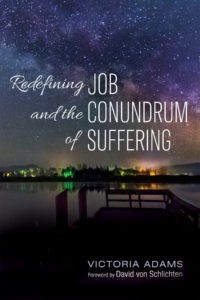To understand suffering, we need to understand something more of the Creator. Through dogma and doctrine, we have developed a definition of a sovereign ruler of the universe that is not big enough to be its creator.
Far too often, we build a box, hang a sign on it, and expect God to live there. We fail in understanding when we insist on creating anthropomorphisms and decide that God is or must be this way, or he isn’t God. How can we discover answers, or know the power of wonder, if we begin by setting boundaries?
Perhaps Maimonides was correct. There are parts within the story of Job which can provide the reader with some comfort. Or, if there is no comfort, those that suffer can retreat to a position that the mind of God is beyond our understanding. However, for those who choose to accept the challenge, there is a definable reason for suffering. Not only is there a prime cause, there is a solution. However, it requires action on our part, and Scripture tells us what that action should be.

“Job and His Comforters,” attributed to Luca Giordano (1634-1705). Courtesy of Smithsonian American Art Museum.
Judeo-Christian Scripture is insistent that we offer aid to those who need us. Caring for those who face challenges of whatever nature is a teaching that is not limited to the New Testament. Proverbs 21:13, “Who stops his ears at the cry of the wretched, he too will call and not be answered.” Ezekiel 16:49, “Only this was the sin of your sister Sodom; arrogance! She and her daughters had plenty of bread and untroubled tranquility; yet she did not support the poor and the needy.” Zechariah 7:9–11, “Thus said the Lord of Hosts: Execute true justice; deal loyally and compassionately with one another. Do not defraud the widow, the orphan, the stranger, and the poor; and do not plot evil against one another—but they refused to pay heed. They presented a balky back and turned a deaf ear.”
From Babylon and Ur to the Large Hadron Collider, our perception of the cosmos in which we find ourselves has undergone many changes. That knowledge should inform us to accomplish more than to engineer better tools of exploration and destruction; it should teach us how to better combat suffering.
The voice from the whirlwind is a call to look at the cosmos and get a better grip on cause and effect. The scriptural warning that the sins of the fathers visit later generations is not a prophecy — it is a statement of fact. Although studies show that the socioeconomic and cultural background of a child does not always determine their future, we do know that the odds can be against a child raised in poverty, violence and discrimination. We know that dumping chemicals into the ecosystem causes sickness. Now we need to find ways to prevent more occurrences or to avoid pending outcomes.
From Genesis to Revelation, we are commanded to love one another, to have compassion, to reduce suffering.
When we choose a course of action that is sure to end in catastrophe, we are disingenuous at best to blame God for not protecting us from the consequences. What the voice in the whirlwind is trying to teach us is that with our drive to name cause and effect, we often get the two confused. If we continue to fight against nature, it will fight back. No supreme being of the universe should be held responsible for rearranging the laws of physics so that when you get behind the wheel of a vehicle drunk, your life and the lives of those who share the road will be spared. How arrogant can we possibly be?
Yes, sometimes, “miracles” occur. Perhaps this time, the driver of the other car is alert to danger and understands that the world can be a cruel and unforgiving place and sees a way to avoid or moderate disaster. For these times, when a split second can change our lives, all the teachings and experiences of our lives make the difference.
That moment of understanding, skill and knowledge is that moment when Providence steps in, when God does hear the cry of our hearts. First, we learn. We learn about the laws that make the world function and that are required to create a viable ecosystem for us to live and for us to reason. Once we learn, we must actively pursue ways to change the things within our power to change. For life in this universe to flourish, there was an absolute necessity for a creative mind that could assess situations, find solutions, imagine alternatives and choose between the outcomes. Free will may be a participatory cause of suffering; however, it is also the answer. We are not fruit flies in a jar of honey, eating and reproducing our way to destruction; we are sapient beings with choices.
I believe that God has responded in the past and continues to respond to suffering in our time. However, his response requires an active partnership between the Creator and the created. That means that humanity must take an active role in learning how suffering occurs and how to respond. Intellectually we know there might be things beyond our comprehension; that is no excuse to stop looking. Emotionally we know that suffering impacts us and those around us. God gave us the choice to be a part of the solution to suffering rather than a vehicle of suffering. Job’s visitors made the wrong choice.
We are offered the opportunity to become a creative force that finds a path through the violence and cruelty of nature to compassion and restoration, to reduce the suffering inherent in the processes that drive our universe. Will we choose to become part of the creation story, or will we die off as an ignoble, failed experiment in consciousness and its ability to build a better world?
Scripture teaches us that this choice is an obligation, the price we pay for our reasoning minds. It is an obligation for the here and now, not some future world. From Genesis to Revelation, we are commanded to love one another, to have compassion, to reduce suffering. It is a personal commitment. Medical practitioners have used “First, do no harm” for centuries. Mahatma Gandhi said, “If we could change ourselves, the tendencies in the world would also change. As a man changes his own nature, so does the attitude of the world change towards him. … We need not wait to see what others do.”
The universe is not an arbitrary, unknowable chaos. Because we can come to know, God directs us to understand, to use our reason to see the path to mitigation, restitution and compassion. The foundation of free will is to choose a path more right, more in keeping with a universe that celebrates life even as the very existence of life is threatened. In The Hobbit: An Unexpected Journey, Gandalf explains that it is not great power that defeats evil; it is the everyday acts of ordinary people.
My study of the book of Job arrives at two fundamental obligations: to learn, and to use the learning to care for ourselves and others, whoever they may be.
In October 2017, David Gerrold posted a statement on Facebook which was a succinct definition of the core values presented in my study of Job:
It’s in our behavior that we demonstrate who we are, who we really are. And if I had to pick the single most important aspect of consciousness, I’d focus on empathy. When we recognize the self-ness of others, their ability to feel, that changes the way we treat them. It changes us. Everywhere we go. It changes how we treat animals and children and the disabled and elderly and people who look different or dress different. It changes how we behave in the world. It changes us. The more we practice that change, the more it becomes a part of us, the defining part. Because — it’s so obvious. Practice makes permanent. And this is my point. Sentience — true sentience — by its nature, cannot be malevolent. It cannot be evil. Because in the recognition that others can hurt, it takes on the resonsiblity of not being the cause of that hurt.
The difficulty is in the definition of “sentience.” Sentience is the capacity to feel, perceive or experience subjectivity. Philosophers have used the term to distinguish the ability to think or reason from the ability to feel (sentience). Gerrold believes that if we truly understand the pain of another, we cannot neglect our obligation to help resolve that suffering.
God answered that both reason and sentience are critical to how we live our lives. Humanity is neither the central point of the universe nor an insignificant bit of stardust. There are times when we must face the consequences of our failures or misguided steps. There are times when the forces of humanity and nature conspire to create undeserved suffering. However, by receiving the gifts of reason and sentience, it becomes incumbent on us to look outward, to learn and to find solutions.
 This opinion piece is excerpted from the forthcoming book Redefining Job and the Conundrum of Suffering by Victoria Adams. This preview is exclusive to Baptist News Global and is used with permission from Wipf and Stock Publishers: www.wipfandstock.com.
This opinion piece is excerpted from the forthcoming book Redefining Job and the Conundrum of Suffering by Victoria Adams. This preview is exclusive to Baptist News Global and is used with permission from Wipf and Stock Publishers: www.wipfandstock.com.
